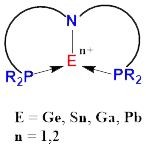The study of compounds with low-valent main group elements or transition metals is an exciting research field in the area of inorganic/organometallic chemistry. These compounds are not only challenging targets, but are also expected to show unforeseen chemistry. Recent years have witnessed N-heterocyclic carbenes (NHC) to stabilize multiply bound main group compounds such as B≡B, Si=Si etc. which are otherwise inaccessible. Our interest is in the synthesis of low valent silicon compounds, mainly silylene and use them as a ligand to stabilize low-valent compounds with main group or transition metals.

The main research focus is on developing novel silicon based frustrated Lewis pairs (FLPs) and utilization of these Si-based FLPs to activate small molecules e.g. H2, CO2, P4, C2H4 etc. to derive catalysts for organic reactions.

Gold(I) complexes and their catalytic activity is another topic of interest. In recent years gold(I) complexes have shown their excellent catalytic activity in many homogeneous transformations involving C-C-π systems (alkenes, dienes, alkynes, allenes, arenes) towards the attack of a large variety of nucleophiles. In the view of that we are involved in developing PNP, PNB, SiNP and SiNB based Au(I) complexes which can be further used in catalytic reactions.

Main group cations especially silylium ions have already shown their potential in Lewis acid catalyzed organic reactions. Silylium ions are extremely strong Lewis acids due to the electron sextet at the silicon centre and this electron deficiency makes them powerful Lewis acid catalysts. Inspired from this fact we are targeting synthesis of other main group elements e.g. Ga, Ge, Sn, Pb based cations which can be used as Lewis acid in catalytic reactions.

Synthesis of compounds with group 14 elements in their low oxidation state
Silicon Based Frustrated Lewis Pairs
Gold(I) complexes and catalysis
Synthesis of Main Group Cations